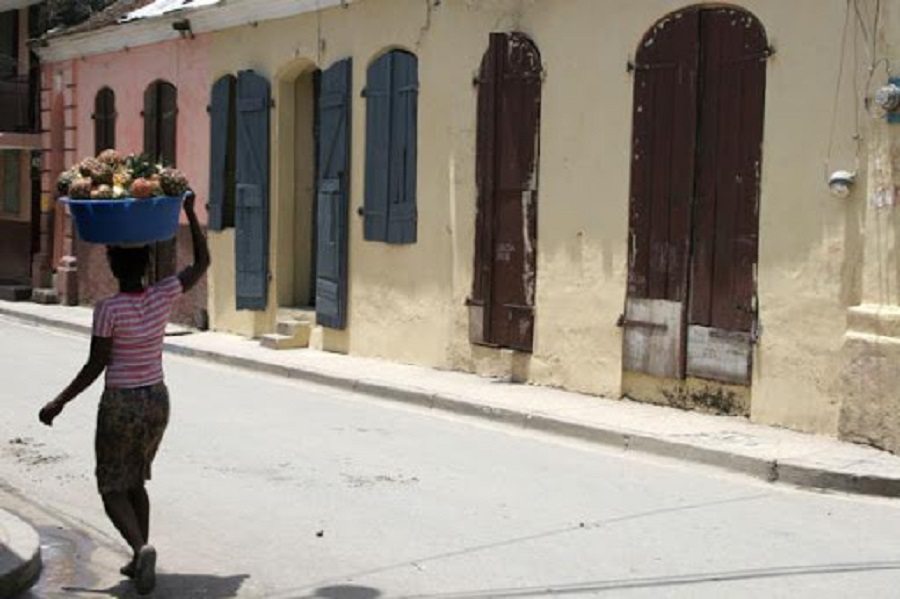RIO DE JANEIRO, BRAZIL – Of all the problems afflicting Clena Dival, her president’s assassination is the least of them. She sits in a squalid section of the Delmas neighborhood in Port-au-Prince next to her business, which consists of a basket laden with hygiene, health, and beauty products: deodorants, toothpaste, soaps, aspirin, nail polish…
The 62-year-old woman has been sitting for several days with her head resting on her hands, amid the dust, the roar of crammed motorcycles and colorful buses, the drivers’ shouts, and the Caribbean heat. Not a single customer. She has not sold a single thing for three days.

The grim reports from international organizations showing that 60% of Haitians live on US$2 a day are far from Dival’s case. In other circumstances, she might have had a better future, given her poetic inclination. When she talks about her good times in Gonaïves, the town where she was born, she sighs and says that “life is like that, sometimes not a single drop, and other times it’s a flood.”
When she summarizes Haiti’s situation, she says that “it’s in a casket, but every time they want to bury it they realize that it’s still breathing,” and when she refers to the assassination of president Jovenel Moïse and the political clash that this generated she summarizes her disdain better than a political scientist would: “They cut off the head of the snake, but left its tail.” In a few sentences, Dival describes the social and political moment of a country that expected chaos after the death of its president, but is so used to living without him that it hardly notices the difference.
Delmas, Carrefour, Tabarre, La Saline, Martissant, Fontamar… Two problems recur in the streets of countless neighborhoods, and neither of them has anything to do with Moïse’s murder: gang violence and the extremely high price of basic products. “Oil, beans, rice… everything has never been so expensive,” he says.
“The situation is very difficult and I don’t make enough to eat once a day,” she laments, looking at all her possessions: a faded basket with hygiene products. The area she occupies is frequently attacked by local gangs fighting for territory, now more emboldened and better armed than ever because they have access to money and weapons from the drug trade; Haiti has played an increasingly important role as an intermediate point to the route that links Colombia and Venezuela to the United States. While hunger has always been present, violence and daily kidnappings are a relatively new phenomenon in Haiti.
“I get up in fear, I walk in fear, and I sleep in fear. Sometimes the criminals show up and start shooting, and we have to run. Then I return to get my goods,” she recounts. “I don’t need the State to help me, I have God for that, what I need is for the price of food to drop,” she says, before placing her head back between her hands, waiting for one of the two to occur.
Under a scorching sun, on Monday morning Dival is in the same place where she was on January 11, 2010, when at 4:53 PM an earthquake – which lasted as long as a traffic light takes to change color – reduced the country’s capital to rubble. That earthquake killed 250,000 people, and the world rushed to assist the poorest country in the Western Hemisphere, sending unprecedented humanitarian aid within days.
So much money and so many international organizations reached Haiti that the Caribbean country came to be known as the “NGO republic”. However, more than a decade later, the same old ills hover.
“I am sorry to say it as the president of Haiti, but we missed the opportunity to build a different country. We had the problem of political instability and we didn’t know what to do with the projects that came from international resources. But we cannot remake history, and we must start over. It was hard for us to receive so much for 11 years without any results,” President Moïse acknowledged in an interview five months before his assassination.
A few meters away from Dival, Visonin Christainval, 29 years old, waits sitting on several bundles of clothes until the tension eases. She has seen police and journalists arriving due to the potential for protests on the streets, and prefers not to unbundle the women’s clothing she sells on the sidewalk in case she needs to run. She came to the capital a decade ago from Cap Haitien, five hours away, in search of a better life – if that is possible in Port-au-Prince – and since then she makes a living selling clothes on the street.
“It is a shame that a president was assassinated like that in his bed. If this happened to him, who had so much security, just think how it is for us,” she says. When talking about the country’s main problems, she insists on delinquency and the price of food. “I don’t know who killed the president and I don’t even care much. I don’t have time to watch the news. All I know is that everything becomes more expensive each day and I can’t even buy half the food I used to,” she explains. Chicken? “That’s for the rich,” she answers with a disinterested frown.
One of the reasons for the rise in the price of products is related to the power accumulated in recent years by gangs that control the capital, led by criminals with names like Barbecue, Tilapli, Izo and Iscor. The country produces virtually nothing, so everything consumed comes in by ship or by road from neighboring Dominican Republic – a route so dangerous that extra vehicles or armed escorts are required to bring cargo to the capital, which has raised prices as high as those of a European capital in some cases.
“Let the Americans come to impose order. We can’t take this any longer,” Christainval despairs.
Source: El Pais

